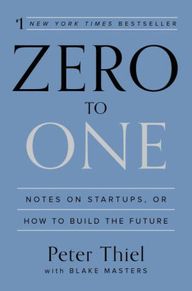38. Zero To One - Peter Thiel (📖)
03 Feb 2018
Rating 9/10
Reading Notes:
Whenever I interview someone for a job, I like to ask this question: “What important truth do very few people agree with you on?”
All failed companies are the same: they failed to escape competition.
We preach competition, internalize its necessity, and enact its commandments; and as a result, we trap ourselves within it – even though the more we compete, the less we gain.
War metaphors invade our everyday business language: we use headhunters to build up a sales force that will enable us to take a captive market and make a killing. But really it’s competition, not business, that is like war: allegedly necessary, supposedly valiant, but ultimately destructive.
Every startup should start with a very small market. Always err on the side of starting too small.
A large market will either lack a good starting point or it will be open to competition.
‘Disruption’ was a term of art to describe how a firm can use technology to introduce low-end product at low prices, improve the product over time, and eventually overtake even the premium products offered by incumbent companies using older technologies.
Don’t disrupt: avoid competition as much as possible.
Business is like chess. Grandmaster Jose Raul Capablanca put it well: to succeed, “you must study the endgame before everything else.”
Every individual is unavoidably an invester too.
Kaczynski argued that modern people are depressed because all the world’s hard problems have already been solved. What’s left to do is either easy or impossible, and pursuing those tasks is deeply unsatisfying. What you can do, even a child can do; what you can’t do, even Einstein couldn’t have done.
People are scared of secrets because they are scared of being wrong.
Now when I consider investing in a startup, I study the founding teams. Technical abilities and complementary skill sets matter, but how well the founders know each other and how well they work together matter just as much. Founders should share a prehistory before they start a company together – otherwise they’re just rolling dice.
Equity is one form of compensation that can effectively orrient people toward creating value in the future.
None of us wants to be reminded when we’re being sold.
Humans and computers together could achieve dramatically better results than either could attain alone.
in 2004, we founded Palantir, a software company that helps people extract insight from divergent sources of information.
If LinkedIn had tried to simply replace recruiters with technology, they wouldn’t have a business today.
The most valuable companies in the future won’t ask what problems can be solved with computers alone. Instead, they’ll ask: how can computers help humans solve hard problems?
As we find new ways to use computers, they won’t just get better at the kinds of things people already do; they’ll help us to do what was previously unimaginable.
Companies must strive for 10x better because merely incremental improvements often end up meaning no improvement at all for the end user.
Cleantech executives were running around wearing suits and ties. This was a huge red flag, because real technologists were T-shirts and jeans. So we instituted a blanket rule: pass on any company whose founders dressed up for pitch meetings.
There’s nothing wrong with a CEO who can sell, but if he actually looks like a salesman, he’s probably bad at sales and worse at tech.
Every entrepreneur should plan to be the last mover in her particular market. That starts with asking yourself: what will the world look like 10 and 20 years from now, and how will my business fit in?
Great companies have secrets: specific reasons for success that other people don’t see.
Doing something different is what’s truly good for society – and it’s also what allows a business to profit by monopolizing a new market. The best projects are likely to be overlooked, not trumpeted by a crowd; the best problems to work on are often the ones nobody else even tries to solve.